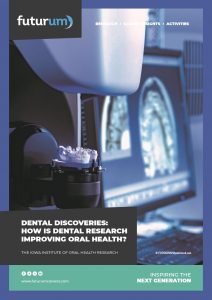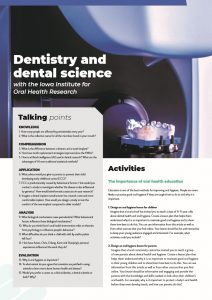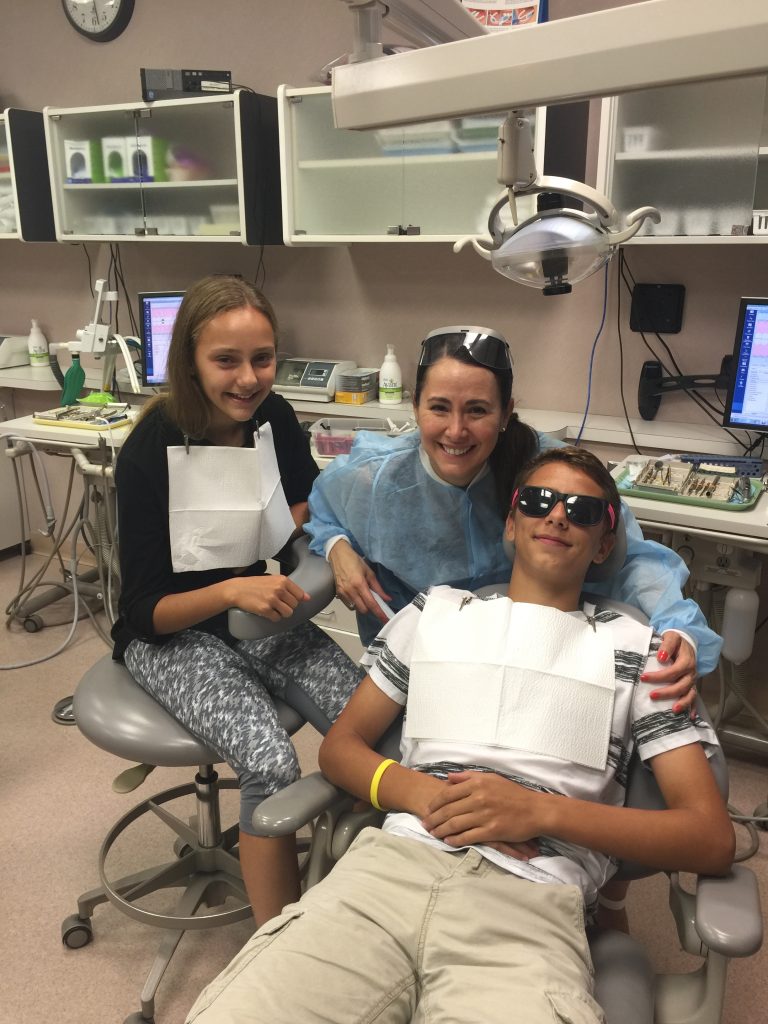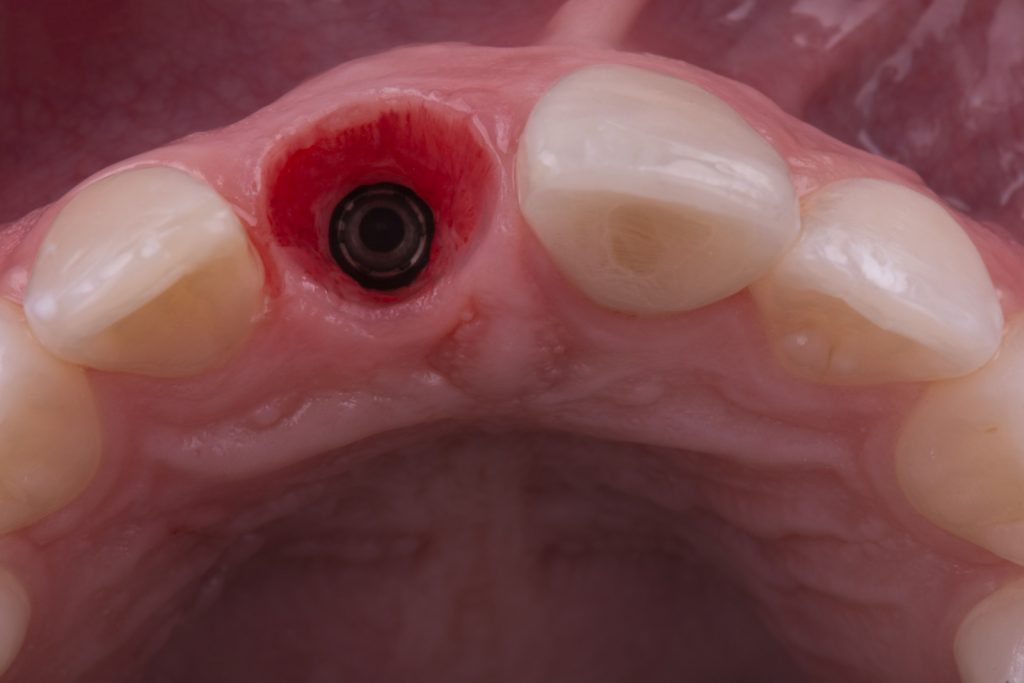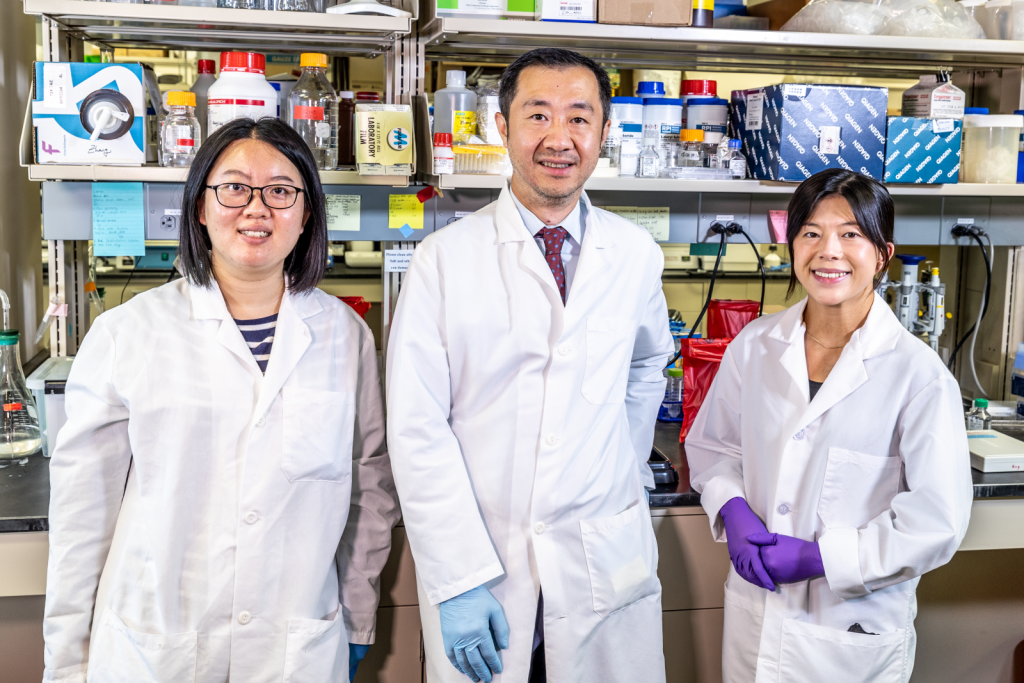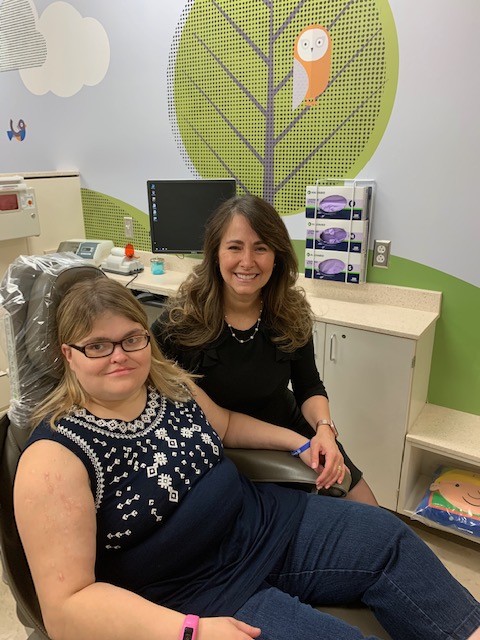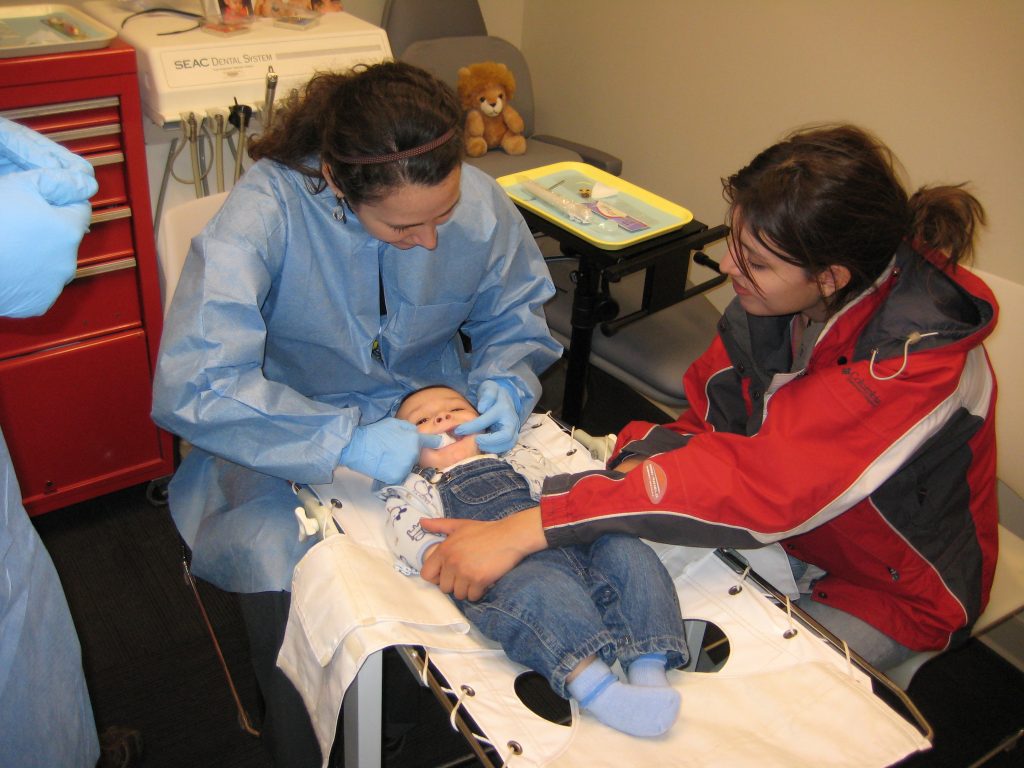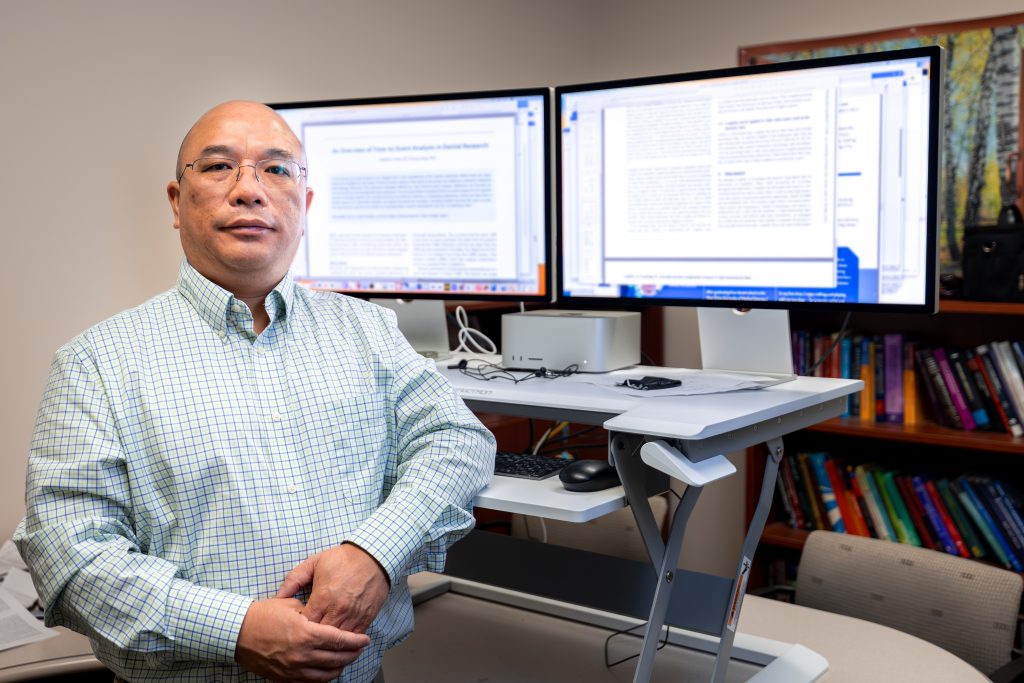Dental discoveries: How is dental research improving oral health?
Many people do not enjoy going to the dentist, but regular dental check-ups are a key aspect of healthcare. Maintaining good oral hygiene is important not only for your teeth, but also for your body and mind. Dental scientists at the Iowa Institute of Oral Health Research at the University of Iowa, USA, are studying various aspects of oral health and healthcare, to improve dental practices and keep our teeth and mouths healthy.
TALK LIKE A DENTAL SCIENTIST
Caries — a hole in a tooth, also known as a cavity
Cleft — a gap or split in the upper lip or palate
Dentures — false teeth that can be removed
Genome — the complete set of genetic material in an organism
Immune system — the network of organs, cells and proteins that protect the body from infection
Implants — false teeth that are permanently fixed in the mouth during surgery
Inflammation — an immune response that can cause swelling, redness and pain
Oral — relating to the mouth
Palate — the roof of the mouth
Periodontal — relating to the periodontium, the tissues that surround and support the teeth. The periodontium includes the gums, alveolar bones (which contain the tooth sockets) and ligaments between them
Periodontitis — a severe form of gum disease
Sitting awkwardly in the waiting room, you leaf through an old magazine, trying to distract yourself from the butterflies whizzing around in your stomach. In the corner, a heap of battered children’s toys lies unused. On the wall, posters grin down at you with gnashing teeth asking, ‘Did you remember to floss this morning?’
Your name is called. You steel yourself, walk into the treatment room and hoist yourself up into the dentist’s chair. As the electric motors whir into life, you are tipped backwards, and a blinding light is swung down into your face. “Say ‘ah’,” coaxes the dentist, snapping on their rubbery latex gloves as they get ready to poke around in your mouth.
Not many people like going to the dentist. In fact, according to some surveys, 80% of Americans get anxious about visiting the dentist. It can be an uncomfortable and invasive experience, particularly if you need more than a routine check-up. Dentistry, however, is incredibly important.
The importance of oral health
A high-sugar diet can lead to tooth decay, so brushing your teeth regularly is essential. Good oral hygiene is vital for protecting your gums as well as your teeth. The World Health Organization (WHO) estimates that, each year, more than a billion people around the world are affected by periodontitis, a severe form of gum disease. Swollen, inflamed and bleeding gums are all signs of periodontitis, which, if left untreated, can lead to tooth loss.
The health of your mouth is closely linked to the health of the rest of your body. Conditions such as heart disease and diabetes have been associated with poor oral health. For example, patients with periodontitis have a higher risk of developing diabetes, while patients with uncontrolled diabetes have a higher risk of developing periodontitis. In both cases, good oral hygiene can lower these risks.
The condition of our teeth and mouth not only impacts our physical health, but also has a significant influence on our mental health. Sparkly white teeth and fresh breath can make us feel confident and happy with our self-image, contributing to an overall sense of well-being. If we do not look after our teeth, the resulting physical discomfort and negative self-image can make us miserable.
So, however you feel about going to the dentist, it is vitally important that you take care of your teeth and mouth. Brushing, flossing and regular dental check-ups can ensure that your teeth, gums, body and mind stay happy and healthy.
The Iowa Institute for Oral Health Research
“Oral health plays a prominent role in fostering overall physical health and a positive self-image,” says Dr Jeff Banas, director of the Iowa Institute for Oral Health Research (IIOHR) at the University of Iowa’s College of Dentistry and Dental Clinics. “The 30-40 faculty, postdoctoral and student researchers in the IIOHR undertake cutting-edge research that comprehensively investigates oral health and disease.” These dental scientists are investigating a range of topics relating to the teeth and mouth, from uncovering the genes that lead to dental abnormalities, to examining the public policies that influence the inequalities in dental treatment. Their shared goal is to increase our understanding of oral health, prevent oral disease and improve dental healthcare.
How do bacteria cause periodontitis?
Dr Shaoping Zhang is researching how interactions between oral microbes and the immune system lead to periodontitis. Our mouths are full of bacteria and, collectively, these microbes form our oral microbiome. Each microbe has a role to play, such as breaking down sugars or preventing harmful bacteria from causing tooth decay. However, the oral microbiome is delicately balanced with the immune system and, if this balance is disrupted, it can lead to periodontitis. For example, a high-sugar diet will cause an increase in the bacteria that break down sugars. Not only can this lead to tooth decay and caries (cavities), as the bacteria convert sugar into acid, but it can also cause gum disease. Immune cells in the gums trigger inflammation to keep the oral bacteria in check, but the disturbance of microbial communities below the gums leads to an imbalance in the immune system. This either results in too much inflammation or too many bacteria, both of which damage the gums and cause periodontitis.
Shaoping is using gingival crevicular fluid (GCF), the liquid found in the gap between a tooth and the gum, to study immune responses to oral bacteria. Proteins in GCF, called inflammatory mediators, trigger inflammation in the gums to fight bacteria. By measuring the level of GCF inflammatory mediators in humans and assessing the expression of these inflammatory genes in mice, Shaoping can learn how the immune system responds to bacteria. He also modifies the genes of these mice to investigate which genes influence periodontal disease.
“Our research has found that the protein interleukin-17 (IL-17) plays a critical role in maintaining periodontal health,” says Shaoping. By studying GCF samples from humans and mouse gum tissue, he discovered that variations in a specific gene associated with the IL-17 pathway results in a weaker defence against periodontal pathogens, a higher concentration of periodontal bacteria and more severe periodontitis.
How else can our genes affect our oral health?
Reference
https://doi.org/10.33424/FUTURUM401
Genetic mutations can lead to health problems. For example, cleft lip and cleft palate are birth defects that form as a baby develops in the womb. They occur when alterations in the baby’s genome cause the upper lip or palate (the roof of the mouth) to not form properly, leaving a hole or ‘cleft’. Professor Azeez Butali hopes to uncover the genetic causes of cleft lip and palate. This could lead to new treatments for the conditions and methods to prevent clefts from forming.
Azeez uses genetic techniques, such as whole genome sequencing (to study an organism’s entire genome) and targeted genetic sequencing (to study specific genetic mutations), in animals and cells to explore which genes are associated with cleft lip and palate. So far, he has discovered three genes that, if mutated, are responsible for causing cleft palate. In the course of this research, Azeez’s team has also discovered another gene that results in dental anomalies, including microdontia (when teeth are smaller than normal) and taurodontism (when the body of a tooth is enlarged at the expense of the tooth’s roots).
How can statistics improve dental health?
Many scientific techniques, such as the genetic sequencing Azeez uses, produce vast amounts of data. To make sense of these data, researchers turn to bioinformatics, the scientific field that uses computers and computational techniques to analyse large and complex biological datasets. “The goal of bioinformatics is to gain a better understanding of biological processes and systems, which can be used to develop new methods and technologies that can improve our ability to diagnose, treat and prevent diseases,” explains Dr Erliang Zeng, a data scientist who uses bioinformatics to study various aspects of dental disease.
Erliang analyses data related to oral health conditions, such as periodontitis, oral cancer and cleft lip and palate. He uses computational techniques to identify statistical patterns in the data that can shed light on the underlying mechanisms that contribute to the condition. Erliang also uses artificial intelligence (AI) techniques to detect patterns in large and complex datasets that might not be apparent using traditional statistical methods alone, for example by identifying correlations between genetic databases and patients’ health records.
As many dental scientists produce large datasets in their research, Erliang collaborates with many of the research teams in the IIOHR to help them analyse their data. For example, he applied bioinformatics techniques to help Azeez identify the genetic variants that cause cleft palate and to help Shaoping identify bacterial colonisation patterns associated with periodontal disease. “These discoveries are significant as they can inform the development of new treatments that target the mechanisms underlying oral diseases, ultimately leading to better oral health outcomes for patients,” says Erliang.
How does our behaviour influence our teeth?
Caries, or cavities, are one of the world’s most common health problems. Caries are holes that form when a tooth is dissolved by the acid produced when bacteria break down sugars. They are commonly caused by a high-sugar diet and inadequate brushing of teeth. Early childhood caries (ECC) particularly impact children from low-income and minority families, which has motivated Professor Karin Weber-Gasparoni to investigate whether behavioural, psychological and educational interventions can prevent this painful disease.
Karin is investigating whether the psychological concept of self-determination theory (SDT) can reduce the risk of children developing ECC. SDT states that a person’s motivation is influenced by their autonomy (sense of ownership) over, competence (sense of achievement) in and relatedness (sense of connection) with their actions. Motivation occurs when someone experiences satisfaction in these three psychological needs.
“The early onset of ECC means that oral health behavioural interventions must be initiated before the child is born,” explains Karin. “This will allow future parents to develop good oral health habits in their baby from birth, rather than trying to change established unhealthy habits later.” Karin is investigating the effectiveness of SDT for preventing ECC by providing low-income pregnant women with SDT-based oral health education, then monitoring the oral health of their children until they are three years old. Her preliminary results indicate this is a successful way to initiate good oral health behaviours, as families reported increased brushing of children’s teeth, reduced consumption of sugary drinks and snacks, and checking for early signs of EEC at home.
What happens when teeth are lost?
Unfortunately, some people have oral diseases that are not treated in time. In these cases, the patient may lose some (or all) of their teeth. When this happens, replacing the lost teeth is crucial for maintaining the patient’s physical and mental health. Lost teeth are replaced by ‘false teeth’, either as removeable dentures or permanent implants, and Dr Chris Barwacz is evaluating different tooth replacement methods.
Implants have been a viable tooth replacement strategy since the 1980s. “Since then, scientific knowledge, biomaterials and digital technologies have progressed significantly,” says Chris. As a result, fitting dental implants is now a standard procedure that is relatively quick to perform. The quality of implants and dentures has also improved in recent years, so they now look and feel better for the patient. Despite these improvements, research is ongoing, not only to improve the implants and dentures themselves, but also to optimise the manufacturing process and implant surgical procedures, and to investigate the periodontal biomaterials that implants are placed in.
Chris conducts clinical research studies to evaluate the outcomes of different implant strategies. These involve monitoring patients who have received different types of implant to assess how they respond. In one study, for example, he analysed levels of gum inflammation following implant surgery by recording clinical measurements (e.g., assessing whether the gums were bleeding), biochemical measurements (e.g., measuring protein expression in the gums) and patient-reported outcomes. In another study, Chris discovered that the way in which the false tooth connects to the implant post has an important influence on the bone that the implant is drilled into. This information is important for manufacturers, so they can optimise their implant designs.
How can you look after your teeth?
Although tooth replacement strategies have advanced significantly in recent years, dentists and dental scientists still focus their efforts on preventing tooth loss in the first place through a combination of providing dental healthcare, conducting oral health research and promoting oral hygiene education. While you cannot control some factors, such as your genetics, that influence your risk of developing dental disease, you can practise good behaviours to keep your teeth and mouth healthy. Brush your teeth twice a day, do not consume too many sugary foods and drinks and, however you feel about visiting the dentist, remember that regular dental check-ups are a key component of oral healthcare.
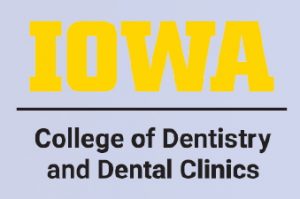 Iowa Institute for Oral Health Research
Iowa Institute for Oral Health Research
College of Dentistry and Dental Health Clinics, University of Iowa, USA
Research projects: Improving oral health and healthcare by investigating factors that cause dental disease
Pathway from school to dentistry and dental science
• At school, study biology, chemistry and mathematics, as these are likely to be requirements for dentistry courses at university.
• If you are interested in bioinformatics and using data science to improve dental health, Erliang also recommends studying statistics, computer science and learning programming languages such as R and Python.
• While it can be hard to gain clinical work experience as a high school student, look for job shadowing opportunities in dental environments. For example, contact your dental practice to see if you could shadow a dentist, technician or receptionist.
• Your pathway to a career in dentistry will depend on where you study and practise, as different countries have different professional requirements. In the US, for example, you will need to complete an undergraduate degree (ideally in a biology- or health-related field) and then study dentistry at postgraduate dental school. In other countries, universities may offer undergraduate degrees in dentistry.
• To become a dental scientist conducting academic research, study a biology- or health-related undergraduate degree (such as molecular biology, biochemistry, genetics or public health), then complete a PhD that applies your field of interest to oral health.
• As a dentistry student at the College of Dentistry and Dental Clinics (www.dentistry.uiowa.edu/education) at the University of Iowa, you will practise what you learn in class by treating patients in the College’s onsite dental clinics.
• The College also offers opportunities for students to experience what dental school and dentistry involve (www.dentistry.uiowa.edu/education/pre-dental-opportunities) and researchers host high school students in their labs.
Explore careers in dentistry and dental science
• Clinical dentists work with patients in dental clinics, conducting check-ups and performing routine procedures such as cleaning teeth and putting in fillings. As a dentist, you could specialise in fields such as orthodontics (straightening teeth with braces), dental surgery (performing more complex operations on the mouth and jaw, such as fitting implants) or periodontics (treating gum conditions).
• The American Dental Association (www.ada.org/resources/careers) and its Mouth Healthy campaign (www.mouthhealthy.org/resources) provide information about different careers in dentistry.
• Dental scientists improve our understanding of oral health by conducting academic research into any topics related to teeth and the mouth. As a dental scientist, you could discover the causes of oral diseases and help develop new treatments for tooth conditions, or study the anatomy of the mouth and the biological processes behind tooth development.
• Chris, Karin and Shaoping work in dual roles as both dentists and dental researchers, dividing their time between treating patients’ teeth in their clinics and conducting research to advance understanding of dental conditions.
Meet the team
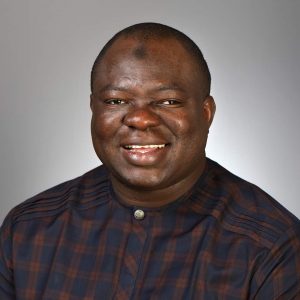
Professor Azeez Butali
Professor of Oral Pathology, Radiology and Medicine
Fields of research: Oral Pathology, Genetics
Research project: Searching for genes related to cleft lip and palate
Funder: US National Institutes of Health (NIH)
I have always been interested in science, which led to me becoming a laboratory prefect in high school. I also enjoyed reading, especially thriller fiction novels and newspapers, and I developed a strong interest in economics.
My late father inspired me to study dentistry and supported me through dental school at the University of Lagos, Nigeria. In my 4th year of dental school, I gave a presentation about guide planes (surfaces where partial dentures are inserted), and my professor applauded my work. She encouraged me to pursue an academic career in dental research.
During an internship, I worked with a patient who had a cleft lip, and this experience motivated me to research cleft lip and palate. Serendipitously, I came across a call for applicants to research the maternal factors that contribute to cleft lip and palate at the World Health Organization (WHO) Collaborating Centre for Craniofacial Anomalies at the University of Dundee, Scotland, and there I gained a PhD in genetic epidemiology.
My personal experience as the father of a child with a genetic disease, who was healed by a bone marrow transplant, is shaping my career as a researcher in the field of genetics. I enjoy being able to inspire the next generation of scholars and contribute my research towards the prevention of cleft lip and palate.
My favourite fact about dentistry is that the mouth is the gateway to the body. It can be used to discover other diseases, as many health conditions are related to oral health.
In my free time, I love reading autobiographies, writing, watching movies and travelling.
Azeez’s top tips
1. Trust your journey and aspire to be the best dental scientist you can be.
2. Focus on learning the clinical skills of dentistry as well as the theoretical science.
3. Be open to learning and mentoring.
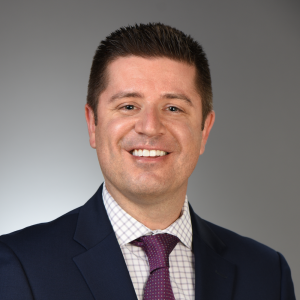
Dr Chris Barwacz
Associate Professor of Family Dentistry, Chair of the Department of Family Dentistry, Clinical Dentist
Field of research: Oral Implantology
Research project: Evaluating the effectiveness of different dental implants
Funder: Dentsply Sirona
I enjoyed biology at school, as it was an extension of my interest in nature. I was fascinated by how molecular processes can have such profound impacts on organisms, from photosynthesis and mitochondrial respiration to muscle contraction.
I identified dentistry as a career by process of elimination, by determining which health-science careers I did not want to pursue. Before going to dental school at the University of Iowa, I worked in a molecular biology lab and as a technician in a hospital pharmacy. While I enjoyed these jobs, I wanted to have more impact on and interactions with people. My wife suggested I explore dentistry, as it combined working with my hands and close patient relationships.
My seven years of working as a research assistant in a molecular biology lab was a rewarding experience which taught me about the scientific method, experimental design, and the rigours of presenting and publishing research. Completing an implant fellowship exposed me to an academic environment and gave me the opportunity to conduct clinical and translational research.
As a clinical dentist, I love that I can make a positive and durable difference to my patients’ lives. As the chair of the Department of Family Dentistry, I enjoy building and supporting a positive team environment to facilitate the growth of our staff and sustaining a world-class educational curriculum for our dental students.
My favourite fact about dentistry is that the alveolar bone (which contains the tooth sockets) belongs to the teeth, not the person. When a tooth is lost, the alveolar bone next to that tooth will disappear due to atrophy and resorption. We tend to think of bones as static, but, due to a biological connection between the tooth and bone, the alveolar bone is dynamic and depends on teeth for its maintenance.
Chris’ top tips
1. Look for work shadowing opportunities in careers that interest you, as gaining practical experience is the best way to know if the career is right for you.
2. Don’t be disheartened if you don’t enjoy a career that you thought you would like. Finding what wasn’t right for me was just as valuable as discovering what I did enjoy, as it helped me make decisions about what I wanted from my career.
3. Remain open to other experiences not directly related to your ideal career. These will still provide rich experiences for you.
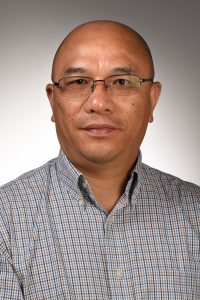
Dr Erliang Zeng
Associate Professor of Preventive and Community Dentistry, Division of Biostatistics and Computational Biology
Fields of research: Bioinformatics, Data Science
Research project: Investigating dental health and disease through bioinformatics
Funders: NIH, US National Science Foundation (NSF), US Department of Agriculture (USDA)
When I was younger, I was fascinated by the diversity of life on Earth, from the tiniest ants to the largest mammals. I enjoyed learning about how organisms interact with each other and are adapted to their environments.
My school biology teacher inspired me with her enthusiasm and extensive knowledge of the subject. Her passion for biology ignited a curiosity in me to learn more about the natural world and its intricate mechanisms. As I progressed through my educational journey, my interest in biology focused on human health and disease. I was fascinated by the underlying mechanisms of illnesses and intrigued by the potential to treat or prevent them through medical research.
After obtaining my master’s degree in biochemistry and molecular biology at Shanghai Jiao Tong University, China, I worked for a microarray data analysis company, where I worked with large-scale genomic datasets and applied computational methods to analyse them. This was a transformative experience that deepened my understanding of the complex biological mechanisms underlying human health and disease and sparked my interest in the field of bioinformatics.
As a bioinformatician and data scientist, I am grateful to have the opportunity to work on challenging problems and use my skills to make a difference in the world. I enjoy the process of finding patterns and relationships in large and complex datasets. And, by providing insights that may inform the development of new treatments, my research has the potential to make a real-world impact on patients. The blend of intellectual challenge, technical skill and social impact that comes with being a bioinformatician is deeply fulfilling.
In my free time, I love pursuing my passion for gardening and growing orchids. I enjoy working with soil and plants, and I find it satisfying to cultivate and harvest my own fruits and vegetables. Gardening provides an opportunity to connect with nature and spend time outdoors, which is a welcome respite from the demands of my work as a researcher.
Erliang’s top tips
1. Seek out research experience. Working on research projects is one of the best ways to gain practical experience, so look for opportunities to participate in research internships or work with research labs.
2. Don’t be discouraged by challenges and don’t be afraid of failure. Instead, view them as opportunities to learn and grow, and remember that persistence and resilience are key to success.
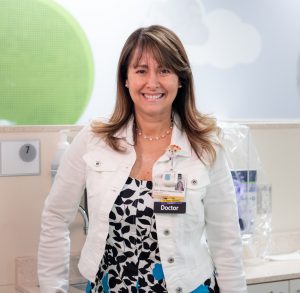
Professor Karin Weber-Gasparoni
Professor of Pediatric Dentistry, Chair of the Department of Pediatric Dentistry, Clinical Pediatric Dentist
Field of research: Paediatric Dentistry
Research project: Investigating whether psychology-based oral health education can influence behaviour and reduce early childhood caries (ECC)
Funder: US National Institute of Dental and Craniofacial Research (NIDCR)
I was a teenager when I had my daughter, Nathalia, who was born with a rare genetic condition, Smith-Magenis syndrome. Dental abnormalities are common in children with Smith-Magenis syndrome, and Nathalia developed early childhood caries (ECC) when she was very young. Experiencing the negative impact this dental disease had on my daughter motivated me to pursue paediatric dentistry in the hope of helping other children and families affected by ECC. By conducting research alongside my clinical dentist work, I hope to prevent this disease from occurring in the first place.
My career has been shaped by my experiences as a low-income single mother to an amazing daughter with special healthcare needs, who immigrated to the US from Brazil in search of the ‘American Dream’. I can relate to children and caregivers who face inequalities in dental healthcare. As a result, I have focused my research on the prevention of ECC in low-income children, and I treat children with special healthcare needs in my dental clinic.
I love the variety of my work – every day is new and different. I provide dental care, teach students in the classroom and clinic, conduct research and participate in outreach activities to serve the community.
I like the fact that everyone has their own distinctive set of teeth – your teeth play a role in your individual uniqueness!
When I was younger, I loved sports, especially gymnastics and fencing. These days, I enjoy spending my free time with my family, meeting my friends for bible studies and helping in my local church.
Karin’s top tips
1. Start building a strong CV early by studying hard, volunteering and shadowing dentists or researchers.
2. Whether you choose a career in clinical dentistry or oral health research, choose it to help others and the rest will fall into place.
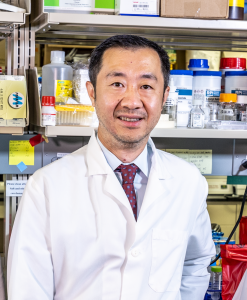
Dr Shaoping Zhang
Assistant Professor of Periodontics, Clinical Dentist, Periodontist
Fields of research: Periodontics, Microbiology, Immunology
Research project: Investigating how interactions between oral microbes and the immune system shape periodontitis
Funders: NIDCR, University of Iowa College of Dentistry, Colgate
I developed a strong interest in medicine when I was in high school. I was convinced I would become a medical doctor, but being a clinical and research dentist is not too far from my dream.
My late mentor, Dr Steven Offenbacher, profoundly inspired me towards my research career and prepared me as a clinician in periodontology. His diligence and passion for research propels me to move forward as a clinician-scientist every day.
After graduating from dental school at the West China University of Medical Science, I worked in a dental clinic. One day, a woman in her forties came to receive her second complete set of dentures as she had lost all her teeth to periodontal disease. I was shocked, as I had never come across a patient who had lost all their teeth at such a young age. This motivated me to specialise in periodontology when I moved to the US and is one of the reasons why I primarily conduct research related to periodontal disease.
I find it rewarding to know that my research may have an impact on understanding periodontal disease. For example, through our research we found that the risk of developing diabetes for people with periodontitis is not equal for all periodontitis patients. Although obesity is a well-known risk factor for developing diabetes, the risk from certain severe forms of periodontitis for non-obese individuals to develop diabetes is greater than it is for obese patients. I think it is interesting that treating periodontal disease in people with diabetes has a similar effect to giving medication for diabetes.
In my free time, I enjoy walking and playing with my two dogs – Taz (a border collie) and Rasco (a Jack Russell terrier). In the warmer months, I also enjoy jogging.
Shaoping’s top tips
1. Pursue a career in something you are passionate about. Your passion will be the energy source that motivates you to push forwards.
2. Be open minded and curious about new advances in your field of interest. For example, new technologies and materials are constantly emerging in dentistry.
3. Persevere when things go wrong and enjoy the journey as you move through your career.
Do you have a question for the team?
Write it in the comments box below and the team get back to you. (Remember, researchers are very busy people, so you may have to wait a few days.)

